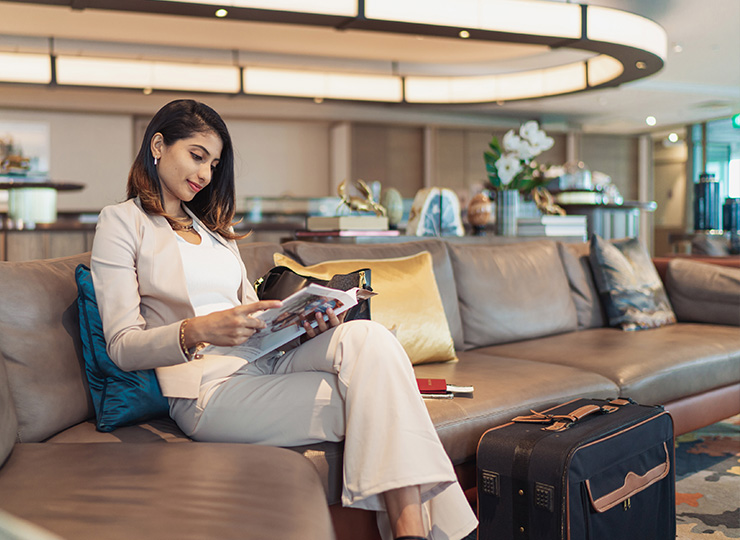

Empowering female business travellers: A guide to confidence on the road
This year’s International Women’s Day (IWD) theme is focused on ‘Inspire Inclusion.’ And, when it comes to business travel, companies may seek to develop and implement comprehensive travel policies and programmes that specifically address the needs and safety of female business travellers. These may include guidelines on safe accommodation, transportation, cultural considerations, and risk management.
According to a 2023 study conducted by World Travel Protection in collaboration with Opinium, it was revealed that female business travellers tend to exhibit a higher level of risk aversion when travelling. The study, which surveyed 2,000 business travellers in Australia, Canada, the US, and the UK, highlights key differences in safety measures adopted by women and men during work-related travel.
The findings indicate that female business travellers, express a strong belief that their employers should prioritise women’s safety, encompassing considerations like avoiding flights that arrive late at night. Notably, the study reveals that 31% of women refrain from travelling or going out alone at night, a percentage significantly higher than the 18% reported by their male counterparts. Moreover, the study uncovers that 46% of female travellers consistently maintain close contact with family and friends to ensure that their whereabouts are known—a proactive safety measure adopted by a slightly lower percentage of men, at 36%.
These insights underscore the importance of recognising and addressing the distinct safety concerns and preferences of female business travellers. As organisations strive to create inclusive and secure business travel experiences, understanding these nuanced differences becomes essential for shaping travel policies and programmes that cater to the diverse needs of their workforce.
In this blog, we will cover just some of the areas organisations may consider when addressing the needs and safety of female business travellers, ensuring they are prepared and ready to travel with confidence.

Cultural and gender norms
Societal and cultural norms can vary widely, and in some places, there may be specific expectations or attitudes towards women that can make female travellers more vulnerable. For the Australian demographic specifically, the World Travel Protection study also highlighted a noteworthy trend with more than double the number of female respondents (39%) expressing discomfort travelling to countries where women’s rights are not adequately protected, compared to only 15% of men.
Understanding and respecting these cultural nuances is crucial. Questions that may need answering and consideration given before approving travel are:
- What special regulations need to be observed in country?
- Are there local dress codes?
- What are the expectations or attitudes towards women at the destination?
Companies may look to implement cultural sensitivity training to educate travellers about the local customs and gender norms of the destinations they visit. This training can help empower individuals to navigate diverse cultural environments more respectfully and safely.
Accommodation considerations
Finding safe female friendly accommodations is an important consideration for female travellers. Issues like poorly lit areas, inadequate security measures, or unfamiliar neighbourhoods may contribute to a heightened sense of vulnerability.
Travel Managers may seek to prioritise hotels with strong security measures with 24-hour reception, well-lit surroundings and common areas, and positive travel reviews regarding the safety of female guests. There is also the consideration of hotels that offer female-only floors, or those that specifically cater to female needs. An example of this is Accor, which has partnered with SHe Travel Club (an independent hotel label designed by women, for women) to work hand in hand to raise the bar and support an improved travel experience for women.
Health and wellbeing
A travel policy should highlight the importance of aligning travel choices with the wellbeing of the traveller. Female employees may encounter business travel requirements during pregnancy or menopause. Attention to things like seat allocations on flights may become more important during this time. Inclusions for updating traveller profile preferences will be important and this will help to ensure appropriate seating is confirmed at the time of booking to enhance their overall comfort when flying, allowing easy access to stand, move around or access restroom facilities. Avoiding flights like red-eye services that may disrupt sleep will also be important.
Offering flexibility in travel schedules allows time for rest and recovery after long flights, especially for those who may be dealing with jet lag or specific health considerations. It also provides time for travellers to reconnect with family at home.
For those who do not feel comfortable venturing far from their accommodation outside of business hours, it will be important to consider having hotel options that provide facilities such as an onsite restaurant, 24-hour room service and health club facilities.
Employees should be encouraged to familiarise themselves with the information available within the company travel policy, ensuring they are well informed about the guidelines and support available during travel. This proactive approach will help align the company’s commitment to ensuring the health, comfort, and overall satisfaction of the female and all travelling employees.
Transportation considerations
Ground transportation may pose additional considerations for female travellers. Issues such as poorly lit public spaces, crowded public transportation, and unfamiliarity with local transportation options can contribute to increased vulnerability. Incorporating the use of private transport or transfer companies and ensuring travel policies outline the importance of arranging airport transfers before travellers arrive and using only official, licensed and reputable taxis will be important.
Countries such as the UAE offer transportation for women only. The ‘pink taxi’ service is driven by females and caters to females and families exclusively. They endeavour to provide a safe and secure way of travelling for women with trained drivers and modern fleet vehicles. In Dubai, the Metro and trams have separate cabins for women use only.
Embracing such solutions and integrating them into travel policies can proactively address concerns faced by female travellers.
Continuous feedback and improvement
It will be important to encourage open communication to allow for improvements to the company’s travel policy and programme. Seeking regular feedback after each business trip will help to understand their experiences and areas that may need adjustments or additional support.
To mitigate risks, companies can implement strategies to enhance the safety and well-being of female business travellers. This includes comprehensive travel policies, access to safety resources, cultural awareness training, and promoting a supportive company culture that values diversity and inclusion. Additionally, female travellers can take proactive steps, such as researching destinations, staying informed about local customs, and utilising technology for enhanced safety measures.
Does your travel programme need a refresh?
‘Inspire inclusion’ with the support of CTM today.




